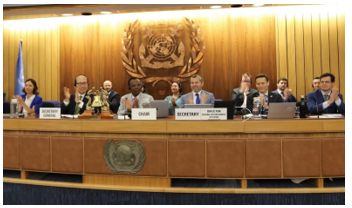- Courses
- GS Full Course 1 Year
- GS Full Course 2 Year
- GS Full Course 3 Year
- GS Full Course Till Selection
- Answer Alpha: Mains 2025 Mentorship
- MEP (Mains Enrichment Programme) Data, Facts
- Essay Target – 150+ Marks
- Online Program
- GS Recorded Course
- Polity
- Geography
- Economy
- Ancient, Medieval and Art & Culture AMAC
- Modern India, Post Independence & World History
- Environment
- Governance
- Science & Technology
- International Relations and Internal Security
- Disaster Management
- Ethics
- NCERT Current Affairs
- Indian Society and Social Issue
- NCERT- Science and Technology
- NCERT - Geography
- NCERT - Ancient History
- NCERT- World History
- NCERT Modern History
- CSAT
- 5 LAYERED ARJUNA Mentorship
- Public Administration Optional
- ABOUT US
- OUR TOPPERS
- TEST SERIES
- FREE STUDY MATERIAL
- VIDEOS
- CONTACT US
IMO ADOPTS REVISED STRATEGY TO REDUCE GHG
IMO ADOPTS REVISED STRATEGY TO REDUCE GHG
08-07-2023

Latest Context
Recently. during the Marine Environment Protection Committee (MEPC 80) meeting the member states of the International Maritime Organization (IMO) adopted the 2023 IMO Strategy on Reduction of Green Gas House Emission (GHG) from ships, with enhanced targets to tackle harmful emissions.
Key Highlights of the 2023 IMO GHG Strategy:
- To reach net zero “by or around 2050”, maritime countries upgraded their GHG emissions strategy without clearly defining the definite year (taking into account different national circumstances).
- Countries agreed on “indicative checkpoints” of reducing emissions from international shipping by at least 20%, striving for 30%, by 2030; and at least 70%, striving for 80%, by 2040, both compared to the 2008 level.
- To decrease the CO2 emissions per transport work, as an average across international shipping, by at least 40% by 2030, compared to 2008. Adopted interim guidance on the use of biofuel and bio-blends in the shipping industry.
Background:
- In 2018, an initial strategy was adopted to reduce the green gas house gas emission that envisaged revision in 2023.
- MEPC handle all environmental concerns like the prevention of ship-source pollution covered by the MARPOL treaty, including oil, chemicals carried in bulk, and emissions from ships.
- Maritime shipping is responsible for 3 per cent of global anthropogenic GHG emissions (IPCC 2022 report)
MARPOL Treaty:
- The International Convention for the Prevention of Pollution from Ships (MARPOL) is considered the main international convention covering the prevention of pollution of the marine environment by ships from operational or accidental causes.
- On 2 November 1973, at IMO, the MARPOL Convention was adopted. The Protocol of 1978 was adopted in response to tanker accidents in 1976-1977.
- Current convention is the result of the 1973 Convention and the 1978 Protocol, that came into force on 2 October 1983.
- It comprises regulations aiming at preventing and minimizing pollution from ships - and currently includes six technical Annexes:
- Annex I: Regulations for the Prevention of Pollution by Oil
- Annex II: Regulations for the Control of Pollution by Noxious Liquid Substances in Bulk
- Annex III: Prevention of Pollution by Harmful Substances Carried by Sea in Packaged Form
- Annex IV: Prevention of Pollution by Sewage from Ships
- Annex V: Prevention of Pollution by Garbage from Ships
- Annex VI: Prevention of Air Pollution from Ships
IMO became the first international regulator for the transport sector to adopt globally binding energy efficiency requirements, which apply to all ships globally, regardless of trading pattern or flag State, aimed at reducing greenhouse gas emissions from international shipping in 2011
International Maritime Organisation:
- It is a specialized agency of the United Nations having a headquarter in London
- Its aim is to improve the safety and security of international shipping and to prevent pollution from ships.
- It also deals with legal matters comprising liability and compensation issues and the facilitation of international maritime traffic.
- Under the auspices of the United Nations in Geneva on 17 March 1948, it was established by means of a Convention. It met for the first time in January 1959.
- It currently has 175 Member States.
Must Check: IAS Coaching Centre In Delhi



